The Power of Protein in Postpartum Recovery: How Nutrition Supports Healing, Energy, and Hormonal Balance After Birth
Why Postpartum Nutrition Matters More Than You Think
After giving birth, your body is working overtime to heal, produce breast milk, regulate hormones, and keep up with the demands of a new baby. It’s no wonder so many moms feel depleted.
That’s where protein comes in.
Protein plays a major role in postpartum recovery—from rebuilding tissue and muscles to supporting your immune system and even stabilizing your mood. And yet, most moms don’t get nearly enough of it during this critical season.
Let’s walk through why protein matters, how much you need, and how to make sure you’re getting enough (even if you’re short on time or following a plant-based diet).
How Protein Helps You Heal
Protein isn’t just for athletes or bodybuilders. It’s a building block your body uses to repair skin, muscles, and connective tissues—especially important after pregnancy, labor, or a C-section. It also supports your nervous system, hormone production, and milk supply if you’re breastfeeding.
Think of protein as one of your body’s main tools for:
- Recovering from birth injuries or surgery
- Managing postpartum fatigue
- Supporting your immune system
- Producing breast milk
- Reducing the risk of mood swings and anxiety
And the benefits go beyond the physical. Protein provides amino acids that help create neurotransmitters like serotonin and dopamine—chemicals that help regulate your mood and emotional well-being.
How Much Protein Do Postpartum Moms Really Need?
Research suggests postpartum moms should aim for about 1.5 to 1.9 grams of protein per kilogram of body weight per day, especially if you’re breastfeeding.
That means if you weigh around 150 pounds (or 68 kg), you’d need between 100 to 130 grams of protein each day.
It may sound like a lot, but it becomes manageable when you spread it out across meals and snacks.
Signs You Might Not Be Getting Enough
It’s easy to miss the signs of protein deficiency, especially in a season where exhaustion feels “normal.” But if you’re not getting enough, you might notice:
- Ongoing fatigue, even when you manage some rest
- Slow wound healing
- Weak or aching muscles
- Hair loss, brittle nails, or dry skin
- Low milk supply or difficulty breastfeeding
- Feeling emotionally off, anxious, or irritable
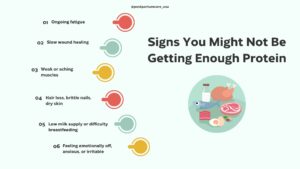
If any of that sounds familiar, it might be time to take a closer look at your nutrition.
Best Sources of Protein for Postpartum Moms
There’s no one-size-fits-all approach to postpartum nutrition, but here are some great options to include in your meals:
Animal-based options:
- Chicken, turkey, beef, or bison
- Eggs
- Fish (like salmon, tuna, or sardines)
- Greek yogurt, cottage cheese, or milk
Plant-based options:
- Lentils, beans, chickpeas
- Tofu, tempeh, or edamame
- Nuts and seeds (chia, hemp, almonds, pumpkin seeds)
- Whole grains like quinoa, oats, or brown rice
Eating a mix of these foods throughout the day will help your body absorb the nutrients more effectively and keep your energy levels steady.
What About Vegetarian or Vegan Moms?
Yes, you can absolutely meet your protein needs on a vegetarian or vegan diet—but it takes a little more planning.
The key is combining different plant proteins to get all nine essential amino acids your body needs. For example:
- Rice + beans
- Lentils + quinoa
- Nut butter + whole grain toast
If you’re unsure about your protein intake or which protein rich foods you should prioritize in this season, working with a postpartum dietitian can help you build a personalized plan that aligns with your values and your body’s needs.
Adequate protein is especially important when you’re on a vegetarian or vegan diet and making sure your protein requirements are met will help tremendously with the healing process.
Can Protein Powder Help?
Sometimes, cooking full meals with a newborn just isn’t happening—and that’s okay. While it’s always preferred that you use real, whole foods as your protein sources, we know it can sometimes be easier said than done, especially in the fourth trimester.
A clean, high-quality protein powder can help fill the gap, especially if you’re recovering from birth, exclusively breastfeeding, or navigating food aversions. Look for options without added sugars or artificial ingredients, and talk with your provider to make sure it’s a good fit.
At Postpartum Care USA, we recommend the protein powders from Just Ingredients. Their protein powder is casein-free, so it’s easier on the stomach, and comes from 100% grass-fed non-denatured whey from New Zealand.
We love the Vanilla flavor because it’s so versatile. You can add it to your morning coffee, pancakes, oatmeal, and it tastes great on its own with milk. Use code: PPCAREUSA for a discount!
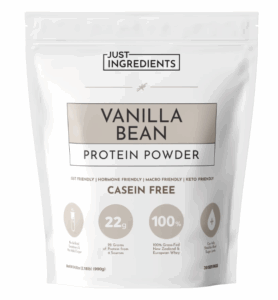
Smoothies, oatmeal, or even quick protein shakes can be simple ways to boost your intake on busy days and make sure your nutritional needs are met even when you’re in a hurry.
Tips for Getting Enough Protein (Without Overthinking It)
Instead of trying to cram all your protein and daily nutrient needs into one or two meals, aim to include it throughout the day:
- Scrambled eggs, cottage cheese, or Greek yogurt for breakfast
- Turkey sandwich, lentil salad, or grilled tofu at lunch
- Protein-rich dinner like salmon, stir-fry with fish and vegetables, or bean chili
- Snacks like hard-boiled eggs, trail mix, hummus with veggies, or a protein smoothie
Even small changes—like adding hemp seeds or chia seeds to oatmeal or having a handful of almonds—can make a big difference.
Supporting Mental Health Through Nutrition
Protein supports more than just physical healing. It plays a critical role in mental health by helping your body create neurotransmitters that stabilize mood and support brain function (Source).
Including protein consistently throughout the day may help reduce the risk of postpartum depression and support emotional regulation—especially when paired with healthy fats, B vitamins, and complex carbs.
Of course, poor sleep and higher amounts of stress also play a role, but striving to meet these current recommendations is going to pay off in the long run.
Why This Matters (Especially If You’re Breastfeeding)
Breastfeeding moms need even more protein to support milk production and meet the needs of their growing baby. Experts recommend closer to the 1.7–1.9 grams per kilogram range if you’re exclusively nursing.
Protein helps ensure your breast milk is rich in the nutrients and antibodies your baby needs—while also keeping your own body from becoming depleted.
Healthy Snack Ideas for Tired Moms
Snacks are your secret weapon when you’re short on time or energy. Try keeping a few of these easy, protein-rich options on hand:
- Greek yogurt or cottage cheese
- Hard-boiled eggs
- Nut butter on apple slices or whole grain toast
- Energy balls made with oats, peanut butter, and chia seeds
- Hummus and whole grain crackers
- Ground beef or shredded chicken in lettuce wraps
- Chomps Beef Sticks
Avoid snacks high in added sugar or refined carbs that can spike and crash your energy—especially if you’re already running low.
Overcoming Common Challenges
You’re not failing if it feels hard to get enough protein—it’s just a tough season. Some ways to make it easier:
- Prep a few protein staples (like shredded chicken, hard-boiled eggs, or bean salad) ahead of time
- Use protein powder in smoothies for quick nutrition
- Mix and match plant-based options if you’re vegan
- Ask for help or use meal delivery services designed for postpartum moms
And don’t be afraid to reach out to us at Postpartum Care USA for personalized support. You don’t have to do this alone.
Final Thoughts
Protein is essential for postpartum recovery—not just for your physical healing, but for your energy, hormones, and mental health too.
The postpartum season can feel overwhelming, but small changes in your nutrition can have a big impact. Whether you’re breastfeeding, recovering from a C-section, or just trying to feel more like yourself again, protein can help support you every step of the way.
If you’re not sure where to start, reach out to a provider or dietitian who understands postpartum care. You deserve support that’s just as strong and nourishing as you are.
Pin This for Later:
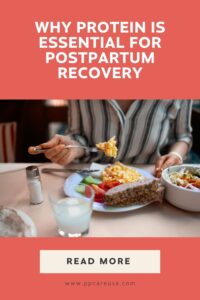
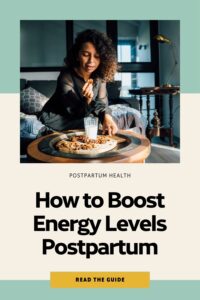
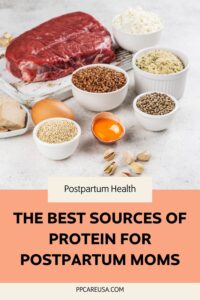
Postnatal Depletion
Meet the Team
Our Services
Supplements
A virtual healthcare clinic that helps postpartum mamas recover from postnatal depletion syndrome with a holistic approach.
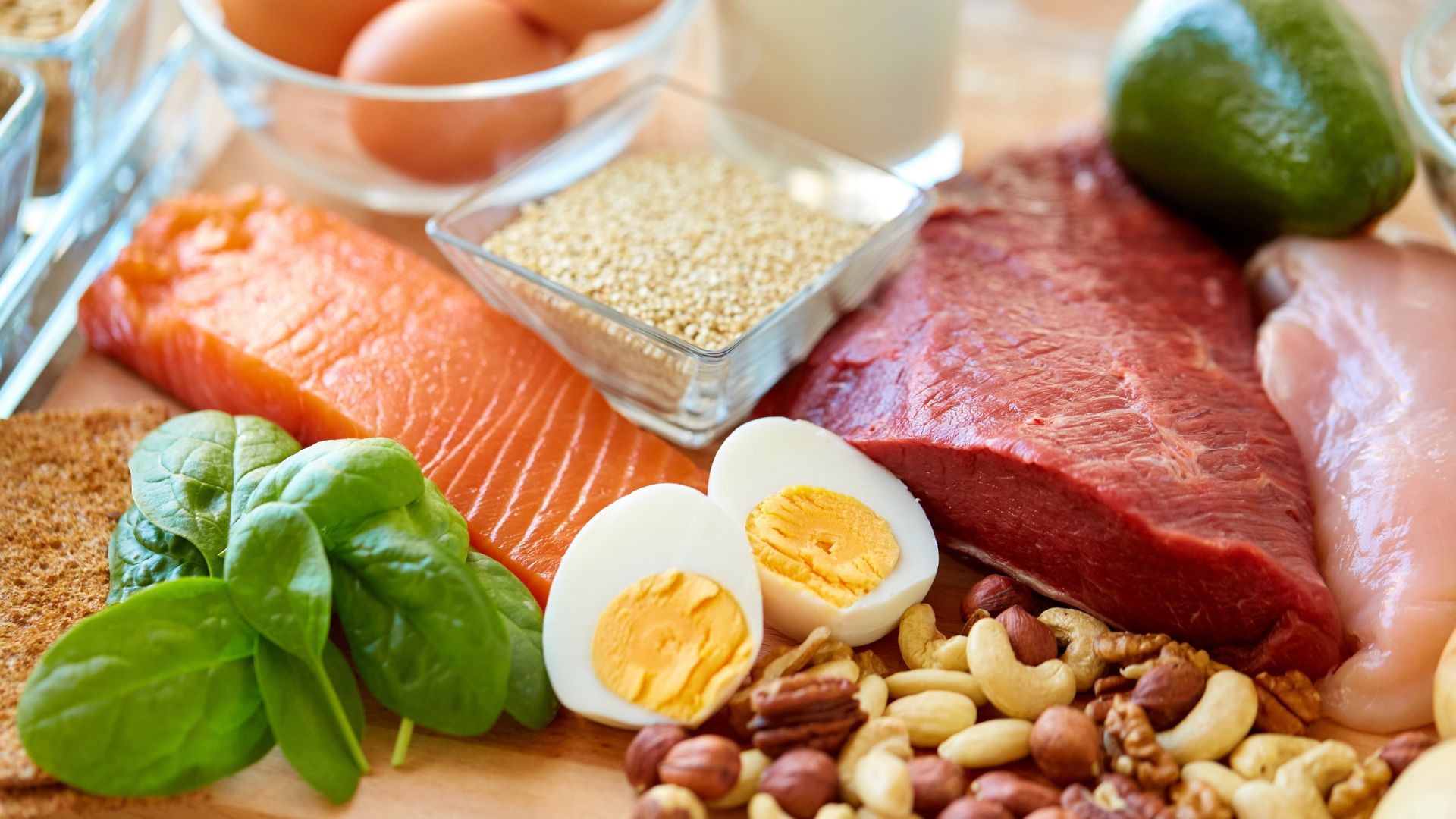
Get in touch